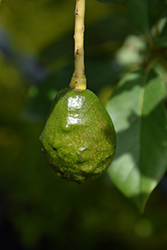It's all about ...
plants

Jim Bacon Avocado
Persea americana 'Jim Bacon'
Height: 20 feet
Spread: 20 feet
Sunlight:
![]()
![]()
Hardiness Zone: 9a
Description:
A popular selection with a smooth thin green skin, featuring fruits with creamy, light flesh, and a rich, nutty flavor; great for eating fresh, added to salads, or blended into sauces or dips; a lovely tree or large shrub, creating a tropical garden look
Edible Qualities
Jim Bacon Avocado is a small tree that is commonly grown for its edible qualities, although it does have ornamental merits as well. It produces dark green oblong fruit (technically 'drupes') with buttery yellow flesh which are typically harvested when mature. The fruit will often fade to black over time. Note that the fruits have hard inedible pits inside which must be removed before eating or processing. The fruits have a mild taste and a fleshy texture.
The fruit are most often used in the following ways:
- Fresh Eating
- Eating When Cooked/Prepared
- Sauces
Features & Attributes
Jim Bacon Avocado has attractive dark green evergreen foliage which emerges coppery-bronze in spring on a tree with an upright spreading habit of growth. The glossy oval compound leaves are highly ornamental and remain dark green throughout the winter. It features subtle clusters of fragrant chartreuse star-shaped flowers at the ends of the branches from late summer to early fall. The fruits are showy dark green drupes which fade to black over time, which are displayed from early to late winter. The fruit can be messy if allowed to drop on the lawn or walkways, and may require occasional clean-up. The rough brown bark adds an interesting dimension to the landscape.
This is an evergreen tree with an upright spreading habit of growth. Its average texture blends into the landscape, but can be balanced by one or two finer or coarser trees or shrubs for an effective composition. This is a high maintenance plant that will require regular care and upkeep, and should only be pruned after flowering to avoid removing any of the current season's flowers. It is a good choice for attracting bees, butterflies and squirrels to your yard. Gardeners should be aware of the following characteristic(s) that may warrant special consideration;
- Disease
Aside from its primary use as an edible, Jim Bacon Avocado is sutiable for the following landscape applications;
- Accent
- Shade
- Hedges/Screening
- Orchard/Edible Landscaping
- Container Planting
Planting & Growing
Jim Bacon Avocado will grow to be about 20 feet tall at maturity, with a spread of 20 feet. It has a low canopy with a typical clearance of 3 feet from the ground, and is suitable for planting under power lines. It grows at a slow rate, and under ideal conditions can be expected to live for 80 years or more. While it is considered to be somewhat self-pollinating, it tends to set heavier quantities of fruit with a different variety of the same species growing nearby.
This tree is quite ornamental as well as edible, and is as much at home in a landscape or flower garden as it is in a designated edibles garden. It does best in full sun to partial shade. It does best in average to evenly moist conditions, but will not tolerate standing water. It is not particular as to soil pH, but grows best in sandy soils. It is somewhat tolerant of urban pollution. Consider applying a thick mulch around the root zone in winter to protect it in exposed locations or colder microclimates. This is a selected variety of a species not originally from North America.
Jim Bacon Avocado is a good choice for the edible garden, but it is also well-suited for use in outdoor pots and containers. Its large size and upright habit of growth lend it for use as a solitary accent, or in a composition surrounded by smaller plants around the base and those that spill over the edges. It is even sizeable enough that it can be grown alone in a suitable container. Note that when grown in a container, it may not perform exactly as indicated on the tag - this is to be expected. Also note that when growing plants in outdoor containers and baskets, they may require more frequent waterings than they would in the yard or garden. Be aware that in our climate, most plants cannot be expected to survive the winter if left in containers outdoors, and this plant is no exception. Contact our experts for more information on how to protect it over the winter months.
This plant is not reliably hardy in our region, and certain restrictions may apply; contact the store for more information.
